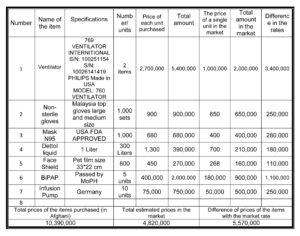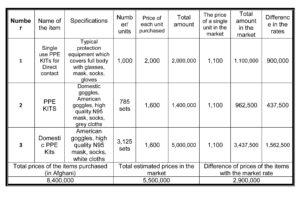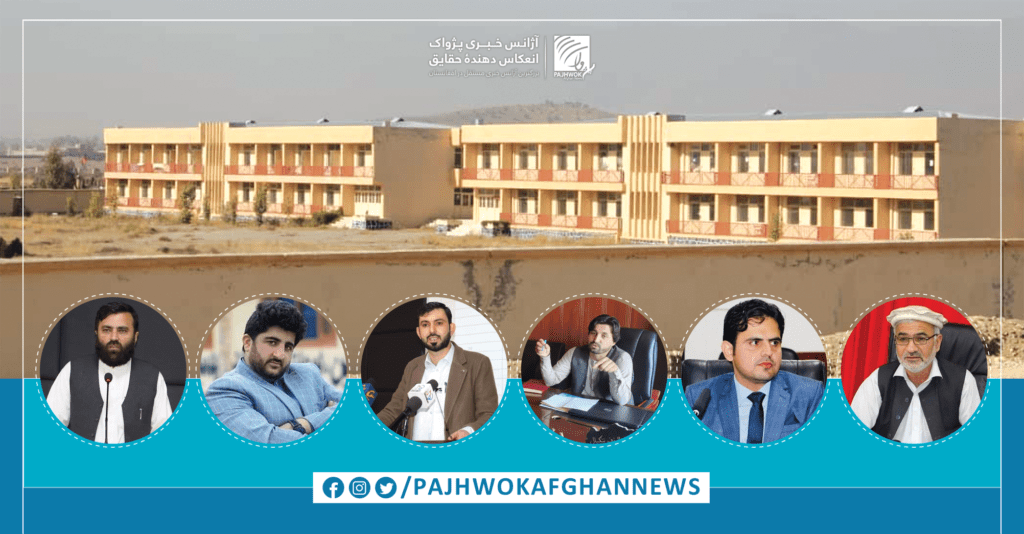KHOST CITY (Pajhwok): Pajhwok’s findings show that an amount of more than 8.4 million afghanis has been embezzled in the purchase of seven types of medical equipment and protective clothing to fight the coronavirus pandemic in southeastern Khost province.
Documents obtained by Pajhwok show the items were bought at a higher rate than the market price. Formalities were not met in the purchase of the items, whose prices are several times higher than market rates
According to the documents, at least 16 key government servants, including the deputy governor, the public health director and the director of finance at the governor’s house, have been referred to the Attorney General Office for the embezzlement of the fund.
A contract for buying 29 types of medical equipment, worth 17,657,000 afghanis, was signed with the Al-Hayat Company on the direction of Deputy Governor Abdul Wahed Patan following recommendations from the public health director on May 18, 2020.
Pajhwok compared the rates of seven of the 29 items to the market price. The rates were double the market prices. Features of the remaining 22 items were not determined.
The seven types of items were purchased for more than 10.3 million afghanis — over 5.5 afghanis higher than the market rate.
The medical equipment included two ventilators, 1,000 non-sterilised gloves, 1,000 N-95 masks, 300 litres of liquid Dettol, 600 face shields, five BP pumps and 10 infusion pumps.
Differences in purchase of equipment:

Purchasing unneeded items and lack of transparency:
Pajhwok’s findings indicate provincial officials not only bought some items at higher prices than the market rates, but also bought unneeded equipment.
As many as 5,000 sets of protective clothing cost of 7,400,000 afgahnis, purchased from two companies based on three different contracts.
At least 875 protective clothing sets worth 1,400,000 afghanis were among the seven types of items 00 based on a contract with the Hekmat Barlas Ingot Company.
As part of another contract with the same firm, 3,125 protecting clothing sets were bought for five million afghanis. Another 1,000 protective clothing sets were purchased at a cost of two million afgahnis from Al-Hayat Equipment Company, The total cost works out at 8,400,000 afghanis.
The protective clothing sets were bought at a rate that is 2,900,000 higher than the market prices, which constitutes 34 percent of the money citied above.
Differences between purchase and market rates:

aAother contract worth 2,650,000 afghanis was signed on May 4,2020 with the Abdul Rahim Azizi Company for blankets, mattresses and carpets. Some of the items were bought at higher rates than market prices.
These items included 750 mattresses, as many pillows, 750 blankets, 750 bed sheets, 750 prayer mats, 400 dustbins and 3,550 square meters of carpets.
The documents obtained by Pajhwok show some of the pages regarding the distribution of these items are undated or without signature. Some other pages have overwriting.
Most of the contracts signed in Khost for the fight against Covid-19 have the same text. Only names of companies and costs of items have been changed. Dates of some other contracts are in conflict and doubtful.
For instance, the contract for buying the seven kinds of items worth 4,150000 is dated April 25, 2020, . But the receipt of the company concerned is dated May 4, 2020.
Similarly, an agreement was signed with another firm for 29 types of equipment, dated July,18, 2020, However, the document regarding the equipment delivery is dated July 13, 2020.
Fund for Covid-19 spent on other things:
Pajhwok also received documents of expenditure that are not directly related to the fight against the spread of the coronavirus. They are in conflict with the areas where the Covid funds have to be spent.
The painting of a girls’ dormitory building and repair of bathrooms at a cost of 3,177,987 afghanis, purchase of a power transformer and related accessories for 2,36,200 afghanis for a hospital dedicated to Covid-19, connection of imported electricity to the hospital at a cost of 1,52,785 afghanis, construction of six mobile toilets on the Khost-Gardez highway for 46,560 afgahnis, as well as the removal of cemented barriers on the highway for 6,000 afghanis, renting a crane at a cost of 6,787,987afgahnis for 10 days are the amounts spent by Khost officials on unrelated things.
Individuals involved in case:
According to the documents obtained by Pajhwok, the people involved in the case have been referred to the Attorney General Office under Articles 388, 389, and 395 of the Penal Code.
Deputy Governor Abdul Wahed Pattan approved the contracts whole Public health Director Dr. Habib Shah Ansari suggested the items’ purchase. Finance Director Hakimullah Akbarri, who is also a member of the procurement committee, proposed the spending of the money.
A representative of the public health department, Dr. Gul Mohammaduddin (also a member of the procurement committee), Revenue Department official Kalam Khan and provincial Finance and Administrative Affairs head Liaqat Khan supported payments for the contracts.
AGO representative Abdul Saboor, also a member of the procurement committee,
Sahar Gul, NDS representative, finance and administration officer Liaqat Khan approving payments for the contract, Abdul Sabur, AGO representative also member of procurement committee, Director of Tribal and Border Affairs Abdul Rauf Nangyal suggested the contract for buying equipment and resources for a school.
Baryalai Shinwary, director of customs, Matiullah Ahmadzai, chief of staff to the governor who suggested the construction of the six toilets. Sayed Anwar Shah, a member of purchase committee, Samiullah, transportation director, Naeem and Kamyab Gul, members of the purchase team, have also been complicit in the case and referred to the AGO for investigations.
Reactions from individuals involved:
Deputy Governor Abdul Wahed Patan denied any corruption in the fight against the coronavirus in Khost. He claimed most of the purchases and services took place to combat the coronavirus. All such steps had been approved by the Public Health Department, the procurement and monitoring committees in accordance with the set procedure.
He said: “Personally, I followed instructions the from former governor, who had given me full authority under the Finance and Public Expenditure Act.”
Patan added most of the medical supplies were purchased abroad during the quarantine period. That was why some items were bought at slightly higher prices, he argued.
“The prices of the item, lower in April, rose in May, and changed the rates changed again in June, because the goods were brought from abroad. Thus the market demand fell and supply increased.”
The deputy governor recalled the market was short of such items no one could visit it due to coronavirus concerns. It was difficult to procure the relevant items, Patan explained.
Meanwhile, Director of Public Health Dr. Habib Shah Ansari said none of the items were purchased by the procurement committee unnecessarily.
He cited the example of the 5,000 protective clothing sets, saying none of them were currently available in the market. But all the sets they bought had been used.
He told Pajhwok: “We have up to 90 health workers. As many as 30 of them are on duty at a time, and those kits no longer exist. All of them have been used. We have brought more kits from the ministry concerned.”
Khost Revenue Director Baryalai Shinwari said he was not involved in the case, as the governor’s office had the authority to spend funds for the fight against the coronavirus and he only ordered the release of the proposed funds.
This report has been produced by Pajhwok and financially supported by UNDP and Denmark.








GET IN TOUCH
NEWSLETTER
SUGGEST A STORY
PAJHWOK MOBILE APP